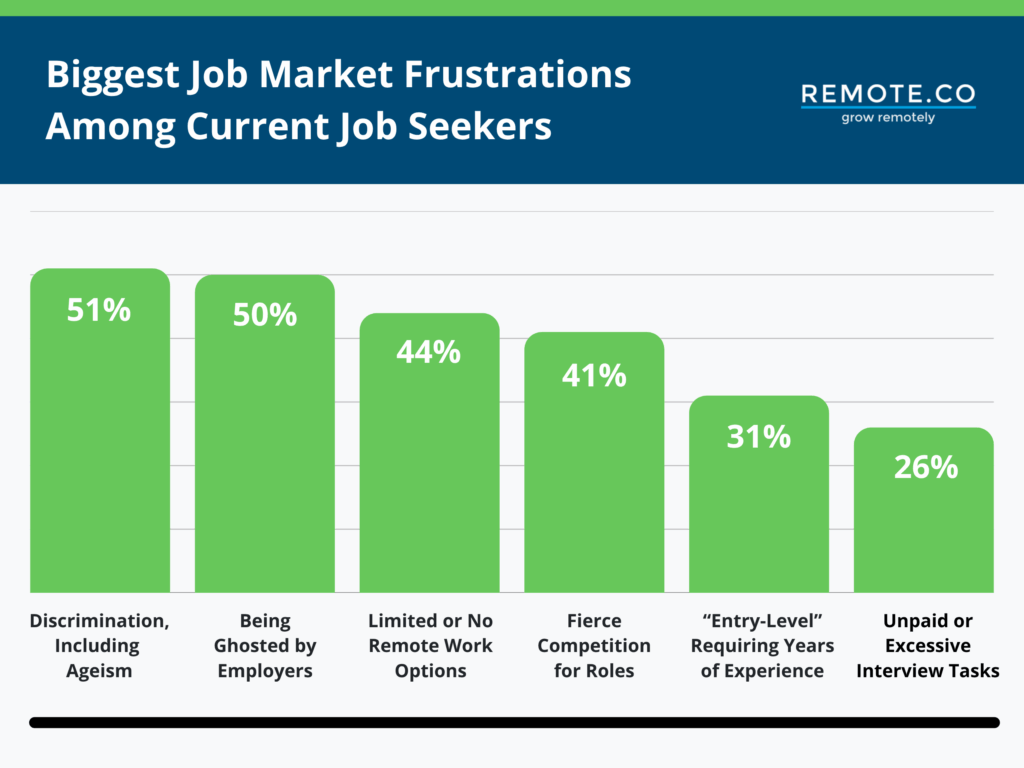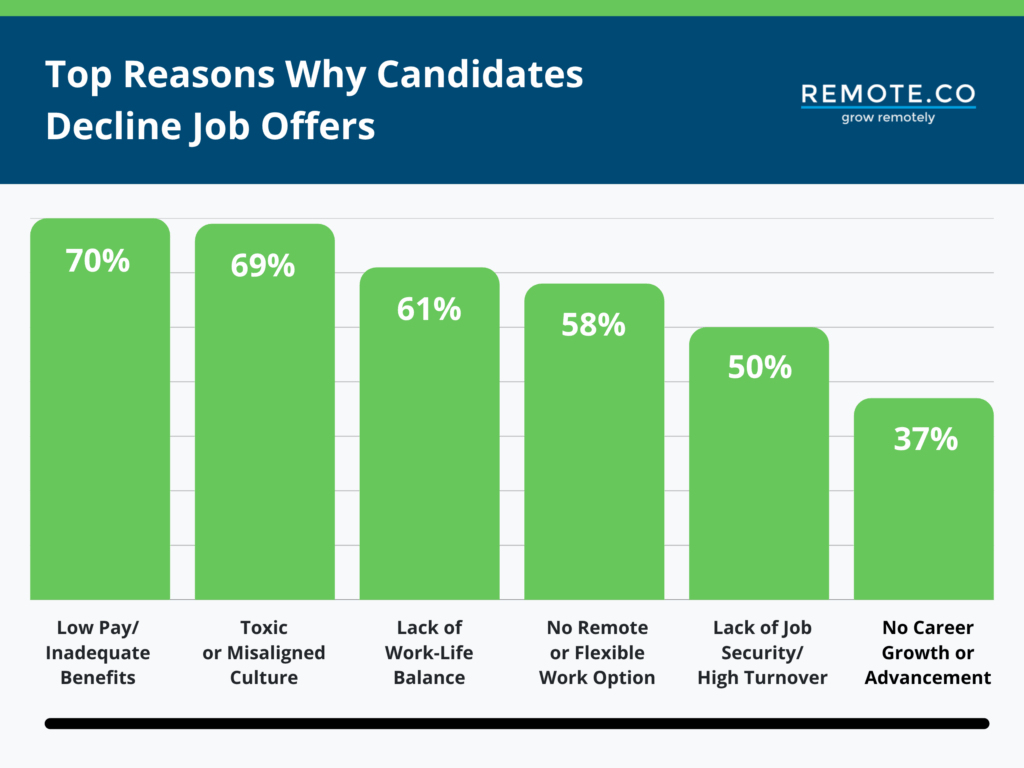Job Search Frustrations & Fears: What’s Haunting Workers in 2025
Last Updated:
By
|
9 min read

As seen in:







Table of Contents

Explore remote jobs at leading companies across 40+ industries.
Job scams, employer ghosting, and AI, oh my! These are just some of the chilling trends today’s job seekers are navigating in an uncertain market. In what seems to be a common nightmare, professionals of all ages, backgrounds, and occupations report growing job search frustrations that interfere with finding their dream job.
For Remote.co’s Job Search Realities & Risks Report, we surveyed over 3,000 U.S. workers to find out what was weighing on their minds. Below, we break down key insights into the real-world challenges workers face and tips to overcome these issues and find career stability.
Job Scams, Ghosting, & Discrimination Plague Modern Job Searches
If searching for a job feels harder than ever, you’re not imagining it. Many professionals say their biggest job search frustrations come from issues beyond their control.
“When looking at the data, it’s easy to see why job seekers are frustrated right now,” said Toni Frana, a career expert at Remote.co. “Ghosting and job scams are seemingly more prevalent than in previous years.”
Remote.co’s survey revealed these job scam statistics in 2025:
- 27% of respondents reported being victims of job scams.
- 12% said they’ve been scammed more than once.
- 23% narrowly avoided a scam because they recognized the warning signs.
Meanwhile, half of job seekers (50%) said they’ve been ghosted by employers, and half (51%) cite discrimination, including ageism, as a top frustration.
And while many in today’s workforce would still prefer to work remotely, just under half (44%) of respondents said limited or nonexistent remote work options added to their stress.
Our report also highlighted several other job market challenges in 2025, including:
- Fierce competition for open roles (41%)
- “Entry-level” jobs that require years of experience (31%)
- Unpaid or excessive interview assignments (26%)
Together, these frustrations, illustrated in the graphic below, paint a picture of a labor market where enthusiasm can quickly turn into exhaustion.

But that’s not all. Artificial intelligence casts a looming shadow over the job market, leaving many workers wondering whether their roles are safe.
Nearly Half of Workers Fear AI Will Take Their Jobs
If job scams and ghosting weren’t frightening enough, AI job displacement fears make many workers uneasy. Nearly half of respondents (48%) said they fear being replaced by AI, a concern that’s spreading across industries and career levels.
Other top concerns among the workforce include:
- Pressure to be “always on” (41%)
- The decline of traditional workplace benefits (38%)
- Decreasing worker rights and protections (37%)
- Expanding return-to-office (RTO) mandates (36%)
- The need to upskill to stay competitive (21%)
In the midst of all the hype, most workers are still craving something refreshingly human. Nearly three-quarters (72%) said they find “pretend-to-work” spaces (mock offices meant to mimic in-person productivity) completely unappealing.
Such fears add up, and job seekers and workers alike are feeling the pressure. This doesn’t just impact the jobs they want to find and keep, but also the ones they avoid or leave altogether. In an age of constant change, that desire for meaning might be the most human instinct of all.
The Real Reasons Candidates Reject Offers and Leave Jobs
If AI represents the unknown, toxic company culture represents what’s already too familiar. While technology and automation may reshape the future, many of today’s biggest job search frustrations come from the present reality of low pay, poor leadership, and unhealthy workplaces.
When asked why they reject job offers, survey respondents answered as follows:
- 70% pointed to low pay or inadequate benefits.
- 69% cited toxic or misaligned culture.
- 61% reported a lack of work-life balance or the expectation to be always available.
Other common deal-breakers included:
- No option for remote jobs or flexible work (58%)
- Lack of job security or high turnover (50%)
- Limited chances for career growth or advancement (37%)
These numbers, outlined in the graphic below, show that workers aren’t simply chasing salaries; they’re looking for stability, trust, and respect.

The same forces that deter job seekers from saying “yes” are also driving employees to leave their current positions. Three-quarters (74%) said a toxic company culture would make them quit or seriously consider it.
Other factors that might cause workers to quit include:
- A bad boss or manager (67%)
- Feeling disrespected or undervalued (63%)
- Low or unfair pay (57%)
- Poor work-life balance (50%)
- Lengthy or difficult commute (28%)
- Lack of remote work flexibility (26%)
It’s clear workers have reached a turning point. They’re no longer willing to tolerate unhealthy conditions or poor leadership just to hold a position. Instead, they’re seeking environments that value people as much as productivity.
For employers, that means a positive culture isn’t a perk but a fundamental promise. For job seekers, that means taking the necessary steps to limit frustrations and find a job that brings lasting success, stability, and satisfaction.
What Job Seekers Can Do to Avoid Scams and Find the Right Fit
The data makes it easy to understand why so many workers feel anxious about their next career move. But the good news is that by following these strategies, you can identify fraudulent job postings, avoid red flags, and focus your energy on opportunities that align with your values.
1. Clarify Your Goals and Target Your Search
The first step to finding the right job is knowing what you need and want. Understand your current qualifications and reflect on what you value most, whether that’s flexibility, fair pay, meaningful work, or professional development. Use those priorities to guide you.
By targeting your search, you can home in on job opportunities that match your qualifications, which means you’re more likely to get noticed. Additionally, you can discover jobs that are more likely to offer long-term satisfaction because they match your interests and goals.
2. Invest in Upskilling to Strengthen Your Candidacy
One of the best ways to overcome job search anxiety is to turn uncertainty into action. Learning new or updated skills, especially those related to technology, communication, or leadership, puts you in a better position to find the right job, especially when it comes to standing out to employers.
“Upskilling or learning new skills highly relevant to your field (including AI tools) shows employers you have a growth mindset and take initiative,” said Frana. Those who lean into learning and self-improvement are positioning themselves not just to survive change but to thrive because of it.
3. Use Reputable Job Search Sites
Stick with verified job boards that prioritize safety and transparency, such as Remote.co. Reputable platforms screen listings and make it easier to find legitimate opportunities. Be wary of job postings on unmoderated social media or classified sites, where scams are more common.
If you’re unsure about a site, check to see if it offers verification badges or employer vetting. Also, look for career resources and articles designed to educate job seekers, not just advertise jobs.
4. Research the Company Before Applying
Take a few minutes to learn about the employer before you apply. Visit the company’s website, look up recent press coverage, and check reviews from employees and customers to get a better idea of the company’s culture and relationship with other stakeholders.
Go a step further and check out the company’s social media and LinkedIn presence, if possible. Look for consistent, up-to-date activity, as well as messaging and information that aligns with the job posting, to verify the company and get a sense of its stability.
5. Look for Red Flags in Job Postings
Scam listings often share similar warning signs. Watch out for:
- Promises of unusually high pay for minimal work
- Requests for money, personal information, or banking details before an interview
- Vague or contradictory job descriptions
- Pressure to respond immediately or skip interviews
- Obvious spelling or grammatical errors
When in doubt, trust your instincts. The modern job market might feel unpredictable, but job seekers have more tools and more power than they realize. The more you clarify your goals and learn to spot red flags, the less those “haunting” job search fears will hold you back.
Find Confidence in a Haunted Job Market
The job market may look a little spooky right now, but fear doesn’t have to drive your search. Whether you’re worried about scams, struggling with employer ghosting, or learning to adapt to AI, you have more control than you might think. By understanding what’s out there and knowing how to protect yourself, you can transform uncertainty into opportunity.
As you deal with job search frustrations, remember: You’re not alone, and you’re not powerless. Take time to reflect, keep learning, and look for employers who value authenticity and respect. Those qualities never go out of style, even in a changing world of work.
About Remote.co
Remote.co‘s remote jobs board is the go-to resource for remote work and remote career information. In addition to verified remote job listings, Remote.co provides in-depth articles, Q&As, and actionable resources to help professionals maximize the benefits of remote jobs and navigate the evolving world of remote work. Featured in publications such as Forbes magazine, BuzzFeed, The New York Times Wirecutter, and more, Remote.co has established itself as a trusted platform for remote jobs and career advice. Follow Remote.co on Facebook, X, and LinkedIn for the latest trends, insights, and opportunities in remote work.
Search Remote Jobs
WRITTEN BY
See more articles from


Join Remote.co to Begin Exploring Remote Jobs



